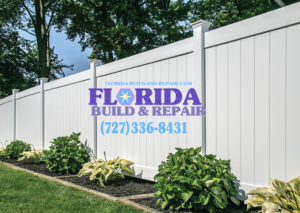Wood Privacy Fence Installation in Oldsmar: Choosing the Right Wood
When choosing the right wood for your privacy fence installation in Oldsmar, several factors come into play, including durability, aesthetics, maintenance requirements, and cost. Here’s a detailed comparison of the most common wood types used for fencing in Florida:
1. Cypress:
- Pros:
- Naturally resistant to decay and pests due to its chemical composition, including cypressene, which repels insects and moisture.
- Offers a beautiful, rustic tan color that ages gracefully.
- Dense and coarse, making it resistant to warping and cracking in Florida’s climate.
- Environmentally friendly as it doesn’t require chemical treatments.
- Cons:
- More expensive than pressure-treated pine, often twice the cost.
- Typically used above ground, with pressure-treated pine posts and rails.
2. Pressure-Treated Pine:
- Pros:
- Affordable and widely available, making it the most common wood type for fencing.
- Treated with chemicals to resist bugs, rot, and water damage, extending its lifespan.
- Can be stained or painted to match your aesthetic preferences.
- Cons:
- Requires regular maintenance to prevent warping, cracking, and fading.
- Less durable than cypress or cedar without proper care.
- Not as naturally resistant to pests and decay as cypress or cedar.
3. Cedar:
- Pros:
- Naturally resistant to decay, insects, and moisture due to its oils.
- Beautiful reddish color with a tight grain pattern and few knots.
- Low maintenance compared to other woods, requiring less frequent sealing.
- Sustainable and environmentally friendly.
- Cons:
- Expensive, often costing up to $5 more per linear foot than pine.
- Difficult to find locally, as it’s typically imported.
- Posts can rot when embedded in soil, requiring special treatment or replacement.
4. Redwood:
- Pros:
- Highly durable, with heartwood lasting 25 years or more without treatment.
- Beautiful color and grain, adding elegance to any property.
- Naturally repels molds, termites, and other insects.
- Cons:
- Expensive due to high demand for outdoor furniture and upscale home applications.
- Not as long-lasting in regions outside of California.
5. Other Woods:
- White Oak: Tough and durable, but tends to warp over time.
- Black Locust: Extremely durable, often used for livestock fencing.
- Tropical Hardwoods: Expensive but offer unique aesthetics and durability.
Considerations for Oldsmar:
- Climate: Florida’s humid subtropical climate means you need wood that can withstand moisture, heat, and pests. Cypress and cedar are naturally suited for this environment.
- Maintenance: If you’re willing to invest time in regular maintenance, pressure-treated pine can be a cost-effective option. However, for lower maintenance, cypress or cedar might be preferable.
- Aesthetics: Cedar and redwood offer a rich, natural look that can enhance your property’s value. Cypress provides a rustic appeal that ages gracefully.
- Budget: Pressure-treated pine is the most budget-friendly option, while cypress, cedar, and redwood are more expensive but offer superior durability and aesthetics.
- Local Availability: Cypress is more readily available in Florida, while cedar and redwood might need to be imported, affecting cost and availability.
Conclusion:
For a wood privacy fence in Oldsmar, cypress stands out as an excellent choice due to its natural resistance to Florida’s climate, pests, and decay, along with its aesthetic appeal. Cedar is also a premium option, offering similar benefits with a different look. If budget is a primary concern, pressure-treated pine can be a viable option, provided you’re committed to regular maintenance. Each wood type has its advantages, so consider your priorities in terms of durability, maintenance, aesthetics, and cost when making your decision. Remember, consulting with local fencing professionals can provide tailored advice for your specific needs.

Hiring a Pinellas County Contractor for Privacy Fence Installation: What to Know
Finding the right contractor for privacy fence installation in Pinellas County requires careful consideration of local regulations, contractor qualifications, and material options. This comprehensive guide

Florida Fence Installation on a Budget: Affordable Options That Look Great
The search for attractive yet affordable fencing in Florida presents homeowners with several viable options that balance cost with aesthetic appeal. Florida’s unique climate and

How Long Does Oldsmar Wood Privacy Fence Installation Take?
The installation of a wood privacy fence in Oldsmar can typically be completed in one to three days by a professional fence contractor. Here are

Wood Privacy Fence Installation in Oldsmar: Choosing the Right Wood
When choosing the right wood for your privacy fence installation in Oldsmar, several factors come into play, including durability, aesthetics, maintenance requirements, and cost. Here’s

Best Tools for Wood Privacy Fence Installation in Oldsmar
Here are the best tools for wood privacy fence installation in Oldsmar: 1. Post Hole Digger or Auger: 2. Shovel: 3. Tamping Tool: 4. Hammer/Nail

Step-by-Step Fence Installation in St. Petersburg: A DIY or Professional Job
Installing a fence in St. Petersburg can be a rewarding DIY project, but it also presents challenges that might make hiring a professional more appealing.

Step-by-Step Guide to Florida Privacy Fence Installation
Privacy fences in Florida require special considerations due to the state’s unique climate, local regulations, and environmental factors. This comprehensive guide walks you through the

St. Petersburg Fence Installation for Uneven Terrain: Tips and Tricks
When installing a fence on uneven terrain in St. Petersburg, there are several effective methods and considerations to keep in mind: Terrain Assessment Before beginning

Professional St. Petersburg Vinyl Privacy Fence Installation vs. DIY: Which One Should You Choose?
Here’s a detailed comparison to help you decide between professional installation and DIY for a vinyl privacy fence in St. Petersburg: Key Considerations Factor Professional


